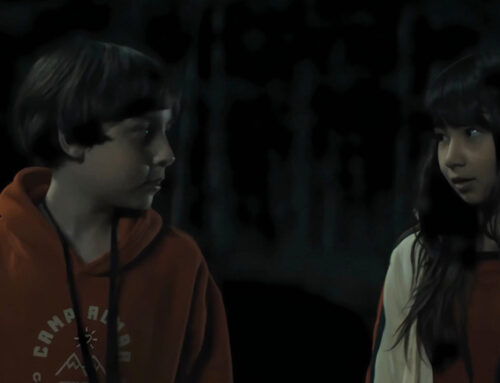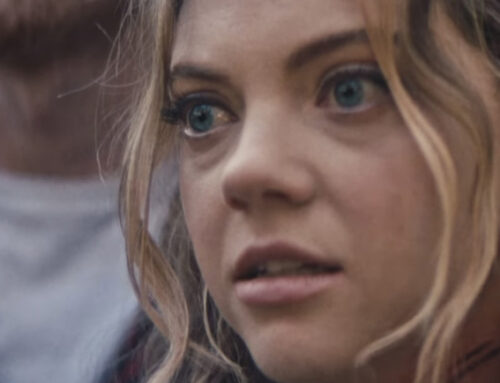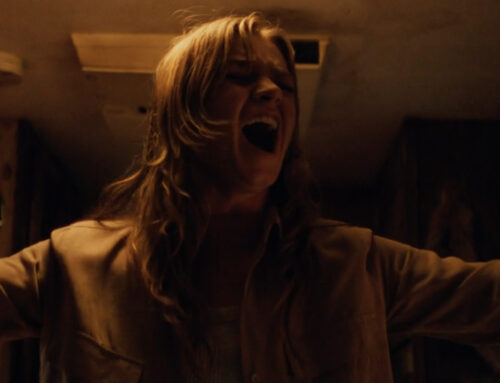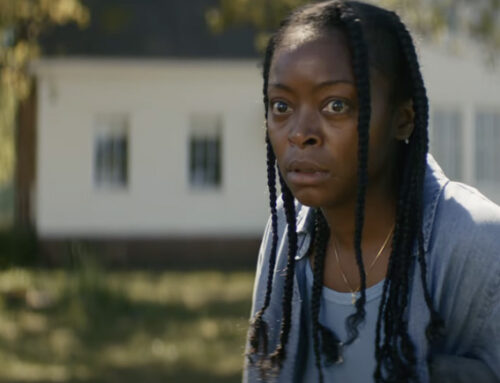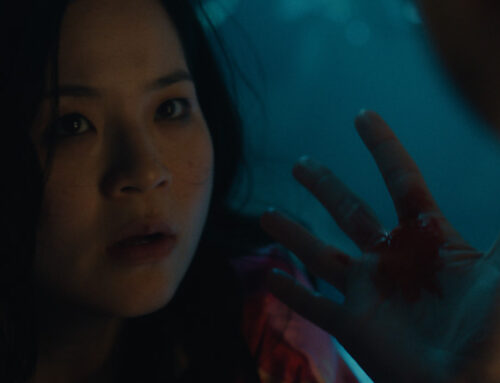The mind of a writer can be a complicated matter. One minute, you’re effortlessly typing away, words pouring out of your soul onto paper. The next, you’re staring blankly at the barren sheet in front of you, practically willing the story to come out. The issue of writer’s block was most famously outlined in Stanley Kubrick’s depiction of Stephen King’s The Shining, where we watch Jack Torrence slowly descend into madness from his inability to write, both from faults of his own, and the haunted property he’s tasked to take care of. In Director Paul Wilkins’ The Ghost Writer, we see parallels to Kubrick’s adaptation as we watch a writer slowly lose his sense of sanity while hunkered down in a secluded location, and delving into more complicated matters of mental health and generational trauma.
Author Gill (Luke Mably) is struggling to keep his career afloat. He’s constantly being compared to his much more famous and successful now- deceased father (also a writer), and after pressure from his agent, decides to retreat to the remote cabin where his father did the majority of his writing.
Once there, Gill is plagued by writer’s block, which is only made worse by the appearance of a mysterious woman named Jane (Andrea Deck), who becomes a constant nuisance in his life. Gill begins to put together the connecting pieces between Jane, his father, and his own sanity, uncovering the disturbing details of his father’s past, which in turn becomes his current conundrum. When he discovers an unpublished manuscript of his father’s and attempts to make it his own, both past and present demons plague him in ways that irrevocably alter both his psyche and career.
The Ghost Writer is a prime example of an original story that takes the proper amount of homage from inspiration, but meanders unnecessarily along the way. While there are obvious notes taken from The Shining, it’s thankfully never overt, offering up the proper amount of originality to keep it fresh and original. Its only true flaw comes from the fact that it tends to get bogged down with exposition and confusing time jumps. While these do all get wrapped up in the end, it may lose viewers by taking too long to get to a point of understanding.
The film’s main problem comes with the character of Jane. She’s presented as an anti-hero; neither good nor bad. After spending a few moments with her on screen, however, you quickly grow tired of her presence. She’s insufferable, pushy, and clueless to her behavior, which is to say, annoying at best, and downright antagonistic at worst. We are given moments where we feel like we should sympathize with her, or at least understand her, but she’s so overtly irritating and intrusive, that she leaves no room for us to like her even a little bit.
If you can put all that aside, though, The Ghost Writer remains a compelling and sympathetic study into a character who truly is trying his best in all facets of his life. Despite his inner demons, Gill is an empathetic character, who feels trapped in his own reality and the complications of his father’s past.
The cinematography by Robin Whenary should be of particular note, because it completely aids in the overall aesthetic and feel of the story, which is the true salvation of this film. Despite the moments that linger too long on certain scenes, and a female character that is nothing short of intolerable, The Ghost Writer remains a film worth discovering, and will be of particular impact to those creatives who find themselves in a desperate situation to create something of substance.
7 Out of 10
| The Ghost Writer | ||
| RATING: | NR |
THE GHOST WRITER Official Trailer (2022) British Horror at FrightFest |
| Runtime: | 1 Hr. 33 Mins. | |
| Directed By: | ||
| Written By: | Paul Wilkins, Guy Fee | |


